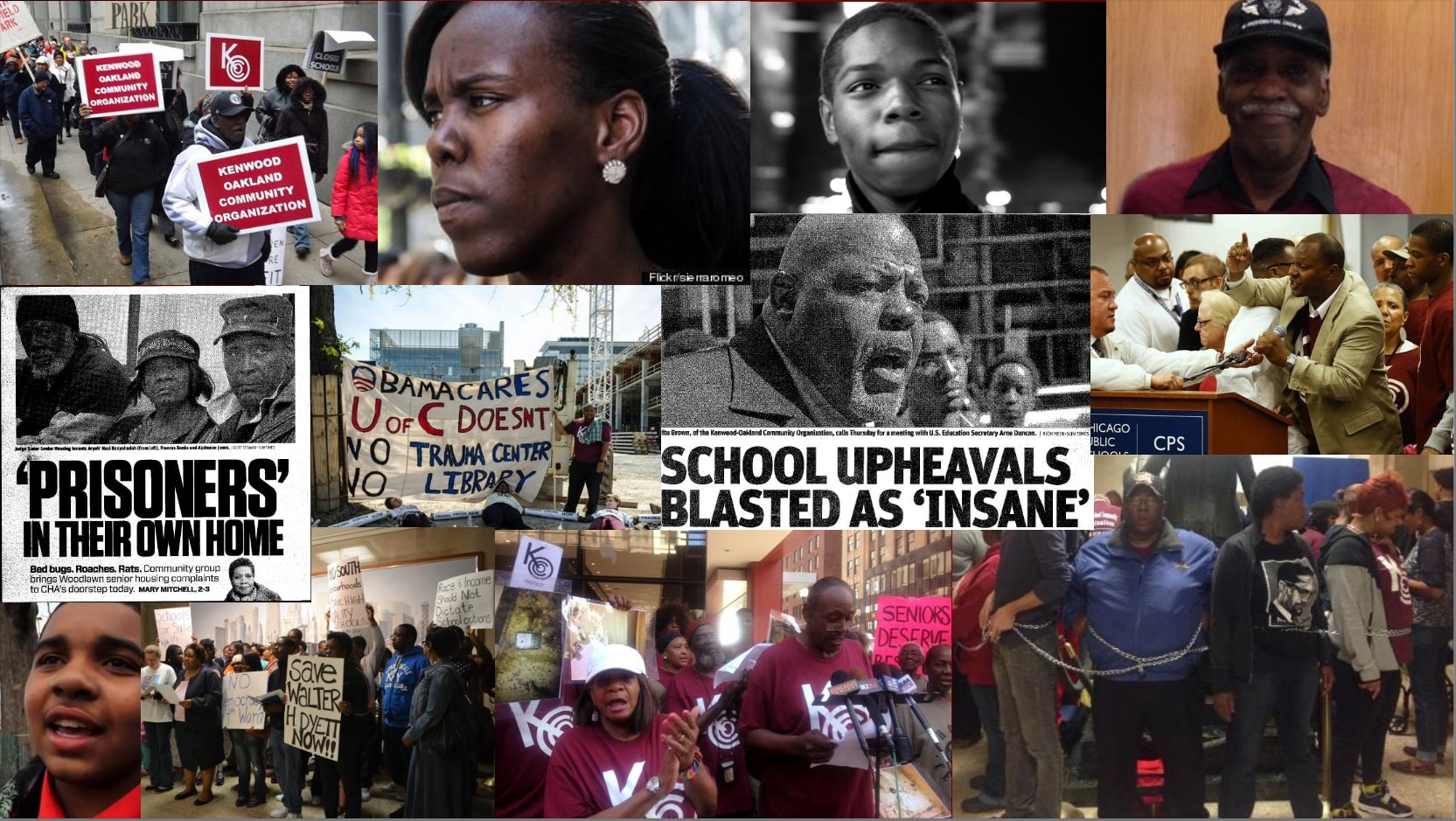Vision
KOCO’s vision is to develop new generations of African American leadership that will build stable, viable, and just communities where opportunity is not denied based on race or economic status.
Mission
Through the sustained engagement of low-income and working families, KOCO develops multi-generational leaders who impact decision-making processes and public policies, improving the quality of life in our local communities.
History
KOCO was founded in 1965 by community and religious leaders from the communities of Kenwood and Oakland as a vehicle for grassroots democracy. KOCO is one of the oldest grassroots, Black membership-based community organizations left in the City of Chicago. Direct action community organizing is KOCO’s primary methodology for change; and is actively engaged in cutting edge, transformative and bold organizing campaigns in the issue areas of affordable housing, equitable education, youth investment, and senior rights. Historically, KOCO’s organizing have led to the construction of King High School to replace one of the only schools Blacks could attend in the area, which was overcrowded at the time; 300 units of affordable housing, a free medical clinic, and the awarding of the federal Empowerment Zone designation.
In recent years, KOCO’s organizing has led to: the re-opening of Dyett High School, which is now a top-performing school; the re-opening of the adult trauma center at the University of Chicago Medical Center, which has exceeded the expected numbers of patients and lives saved; and a community benefits agreement to protect low-income and working Black families in Woodlawn from displacement as a result of the real estate speculation accompanying the Obama Presidential Center.
KOCO members are mainly residents of the north Kenwood and Oakland communities. Predominantly comprised of low-income and working African American families, these neighboring communities hold nearly 20,000 people; one-quarter of whom live below the poverty line. Close to the same number of residents are outside of the job market. One-quarter of KOCO’s leaders are between the ages of 13 and 21 years. Several leaders are descendants of families who have lived in the Bronzeville area for more than a half-century.

Our Timeline
1967: Beginnings
KOCO incorporates as a 501(c)3 organization. Rev. Jesse L. Jackson, Sr., is hired as KOCO’s first executive director just months before he moves on to start Operation Breadbasket for the Rev. Dr. Martin Luther King, Jr.
1967-1971: Rapid Growth
Rev. Curtis E. Burrell, Jr., becomes the 2nd Executive Director of KOCO. Rev. Burrell partnered with the Jewish Council on Urban Affairs (JCUA) to produce KOCO’s first brochure. Rev. Burrell partnered with the Community Renewal Society (CRS) to develop a free day care center, a plastics manufacturing employment training program, construction projects, and plans for a health care clinic.
1971: Building a Legacy
KOCO organized community involvement to build King High School to replace the overcrowded Forrestville High School.
1975: Community Health
KOCO organized to build the Kenwood Oakland Medical, Ltd., (KOMED) Health clinic, which would merge with the Holman Clinic in 1997.
1975-2000: Grassroots Leadership
Robert L. Lucas becomes KOCO’s third Executive Director. Mr. Lucas exemplified KOCO’s ground-up approach to building community leadership. In 1969, he joined KOCO as the leadership training coordinator after an impressive stint as a fiery organizer with the Congress of Racial Equality (CORE). In 1972, Mr. Lucas became the Chairman of the KOCO Board of Directors. Three years later, he was named Executive Director.
1987-1988: Building Homes
The first Black Mayor of Chicago, Harold Washington, broke ground at the site that KOCO developed as the Woodlake Village Townhomes. Our development replaced a vacant lot that had become a waste dump.
Throughout the 1990s: Community Development
KOCO continued to organize for balanced community development that led to the creation of 400 units of affordable housing, the Lake Park Pointe shopping center at 47th & Lake Park, and the designation of North Kenwood-Oakland as a community conservation area.
2000-2012: Community Organizing
In 2000, Jhatayn “Jay” Travis became KOCO’s fourth Executive Director, after having served at an international human rights organization.
Ms. Travis ushered in a renaissance of community organizing activity, refocusing KOCO’s attention to grassroots leadership development. Campaigns included youth investment, affordable housing, equitable education, and community input in Chicago’s bid to host the 2016 Summer Olympics.
2012-2020: Creating Change
In 2012, J. Brian Malone became the fifth Executive Director of KOCO. Mr. Malone continued to utilize community organizing as the primary methodology to create change for low-income and working families.
KOCO garnered national attention as it organized parents and allies in a 34-day hunger strike that saved Dyett High School, after Chicago Public Schools had planned to close it.
2020-Present: Preparing for Unprecedented Growth
In 2020, Shannon Bennett became the sixth Executive Director of KOCO. With the world facing the global coronavirus pandemic, KOCO and the community health coalition CHEC successfully fought against the closing of Mercy Hospital and played a role as new ownership came into power. Insight Mercy Hospital Chicago cared for patients in and around Bronzeville.
KOCO also began delivering fresh food, cleaning supplies and safety products to thousands of residents of senior buildings while the city mostly shut down to prevent spread of the coronavirus.
As the pandemic conditions eased, KOCO set the foundation for a new chapter. Its headquarters at 4242 Cottage Grove Ave. are being renovated to add a café that will provide jobs for neighbors and a daytime gathering spot for seniors. Expanded community meeting space also is planned. And KOCO is training young people for careers in entrepreneurship, technology, and trades, while ensuring communities in and near Bronzeville can take advantage of the coming clean-energy boom.
KOCO is expanding its reach while remaining at heart a community organizer that supports intergenerational leadership development and builds change-oriented institutions.

